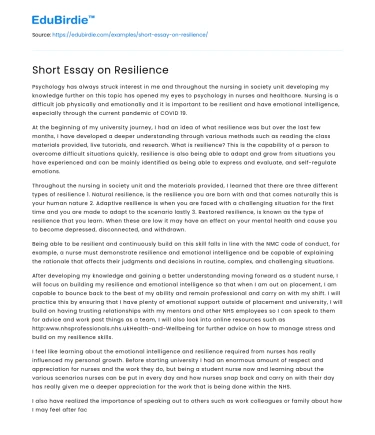Psychology has always struck interest in me and throughout the nursing in society unit developing my knowledge further on this topic has opened my eyes to psychology in nurses and healthcare. Nursing is a difficult job physically and emotionally and it is important to be resilient and have emotional intelligence, especially through the current pandemic of COVID 19.
At the beginning of my university journey, I had an idea of what resilience was but over the last few months, I have developed a deeper understanding through various methods such as reading the class materials provided, live tutorials, and research. What is resilience? This is the capability of a person to overcome difficult situations quickly, resilience is also being able to adapt and grow from situations you have experienced and can be mainly identified as being able to express and evaluate, and self-regulate emotions.
Throughout the nursing in society unit and the materials provided, I learned that there are three different types of resilience 1. Natural resilience, is the resilience you are born with and that comes naturally this is your human nature 2. Adaptive resilience is when you are faced with a challenging situation for the first time and you are made to adapt to the scenario lastly 3. Restored resilience, is known as the type of resilience that you learn. When these are low it may have an effect on your mental health and cause you to become depressed, disconnected, and withdrawn.
Being able to be resilient and continuously build on this skill falls in line with the NMC code of conduct, for example, a nurse must demonstrate resilience and emotional intelligence and be capable of explaining the rationale that affects their judgments and decisions in routine, complex, and challenging situations.
After developing my knowledge and gaining a better understanding moving forward as a student nurse, I will focus on building my resilience and emotional intelligence so that when I am out on placement, I am capable to bounce back to the best of my ability and remain professional and carry on with my shift. I will practice this by ensuring that I have plenty of emotional support outside of placement and university, I will build on having trusting relationships with my mentors and other NHS employees so I can speak to them for advice and work past things as a team, I will also look into online resources such as http:www.nhsprofessionals.nhs.ukHealth-and-Wellbeing for further advice on how to manage stress and build on my resilience skills.
I feel like learning about the emotional intelligence and resilience required from nurses has really influenced my personal growth. Before starting university I had an enormous amount of respect and appreciation for nurses and the work they do, but being a student nurse now and learning about the various scenarios nurses can be put in every day and how nurses snap back and carry on with their day has really given me a deeper appreciation for the work that is being done within the NHS.
I also have realized the importance of speaking out to others such as work colleagues or family about how I may feel after facing a difficult situation during placement. Before starting the adult nursing course, I was nervous to be faced with a death as I was unsure how to handle my emotions afterward but through research and learning about emotional intelligence and resilience, I feel much more confident about being faced with difficult scenarios such as this.
Due to nursing being a difficult career both physically and emotionally attending placement will help build on my resilience skills and help me to further develop my professionalism. For example, as a student nurse, I will come across and witness upsetting situations that may affect me emotionally such as death as previously mentioned, terminally ill patients, potentially delivering upsetting news to families.






 Stuck on your essay?
Stuck on your essay?

